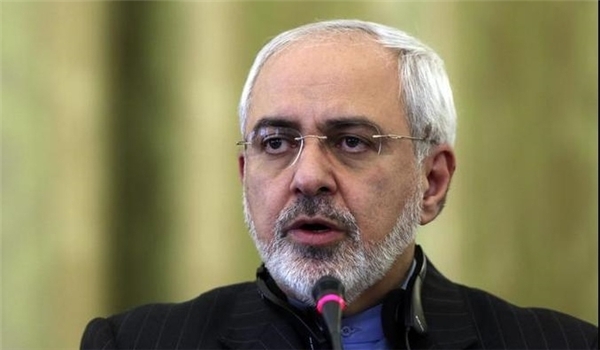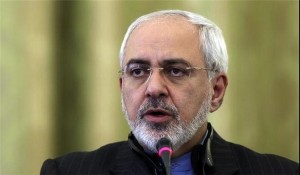
 Iranian Foreign Minister Mohammad Javad Zarif in a meeting with Iraqi President Fouad Masoum in Baghdad on Sunday called for collective anti-terrorism efforts in the region.
Iranian Foreign Minister Mohammad Javad Zarif in a meeting with Iraqi President Fouad Masoum in Baghdad on Sunday called for collective anti-terrorism efforts in the region.
“The time has come for regional cooperation to have all-out fight against terrorism,” the Iranian foreign minister said during the meeting in the Iraqi capital.
He noted that Iran has been beside the Iraqi nation since the very first day it came under attack by Takfiri terrorists, and said, “We believe that now regional cooperation is needed to fight terrorism and we have also held some talks to this end.”
The Iranian foreign minister pointed to the status quo of Iran-Iraq relations, and said, “We will support the future government of Iraq to the same extent that we supported (former Iraqi Prime Minister) Nuri Al-Maliki who played a great role in the campaign against terrorism.”
The Iraqi president, for his part, pointed to the status quo in the relations between Iran and Iraq, and said, “We support Iran’s role in supplying humanitarian aids (to Iraq).”
He further assured the Iranian top diplomat that all political groups in his country, including the Shiites, Kurds and the Sunnis are having good cooperation.
Zarif met the Iraqi president after his meeting with the Arab country’s Prime Minister Haidar al-Abadi, former Prime Minister Nouri al-Maliki and Parliament Speaker Salim Jabouri on his first day of visit to the country.
He also met head of the National Alliance Ibrahim Jafari and Head of the Islamic Supreme Council of Iraq Seyed Ammar Hakim today.
Upon arrival in Iraq this morning, the Iranian foreign minister renewed Tehran’s support for the Iraqi people’s fight against terrorism.
“The Islamic Republic of Iran has always stood and will stand beside the Iraqi people (in their campaign against terrorism),” Zarif told reporters upon arrival in Baghdad on Sunday.
He said the Iraqi people have felt the serious threat of terrorist groups to their country, adding that the nation sees this threat not “as a sectarian strife among different tribes or religious groups but as a major danger to all Iraqi people which needs to be confronted by all”.
Zarif expressed the pleasure that the wave of terrorist attacks has been controlled in Iraq by the help of religious leaders, and said, “We hope that this danger will be obviated with solidarity and coordination among all Iraqi groups, and that peace and tranquility will return to Iraq again.”
Later on Sunday, Zarif met with his Iraqi counterpart Hoshyar Zebari. Following the meeting, the Iraqi foreign minister told reporters that Tehran and Baghdad have been cooperating in the campaign against the ISIL terrorist group.
He also appreciated Iran for its cooperation in the fight against terrorism in different parts of Iraq, and said, “At present, a new reality has emerged in the region, and the international community has come to feel the danger of ISIL.”
“We have demanded international support for our war on terrorism, which is a normal move in the contemporary world. When we asked for international support against the ISIL, we didn’t want military forces since there are no deficiencies in the number of Iraqi army forces and the peshmerga (the Iraqi Kurdish fighters),” the Iraqi prime minister said, implying that cooperation with Iran does not include presence of Iranian soldiers in his country.
Zarif also told reporters that Iran’s anti-terrorism cooperation with Baghdad does not include deployment of troops in the crisis-hit country.
His remarks came after Iranian Defense Minister Brigadier General Hossein Dehqan rejected media reports on the presence of the country’s military forces in Iraq to fight the ISIL, saying that Baghdad does not need assistance of Iranian troops in its combat against the terrorist group.
“We have made official announcements that we would not spare any effort to assist and back up the Iraqi government and nation in grounds of combat against terrorists, but when it comes to military assistance we believe that there is no need to Iran’s direct presence in Iraq to confront Daesh (ISIL) as the Iraqi nation and government, relying on the central role of the religious authority, are able to confront it,” Dehqan said in a press conference in Tehran on Saturday.
He described the ISIL as a terrorist group at the service of the Zionist regime, and said, “Those who supported them yesterday and support them today too have now come to realize the correctness of Iran’s words that they (the ISIL members) contribute to insecurity in the region.”
“Today the US and France should take action to compensate for their supports (for the ISIL) and become united against Daesh,” Dehqan said.
Late in June, Iraqi Ambassador to Tehran Mohammad Majid al-Sheikh rejected certain media claims about the presence of Iranian military forces and Commander of Iran’s Islamic Revolution Guards Corps (IRGC) Quds Force General Qassem Soleimani in Baghdad.
The US Wall Street Journal in a report in June claimed that Tehran has sent two elite units of its IRGC to Iraq to fight against the ISIL terrorists – an Al-Qaeda offshoot.







